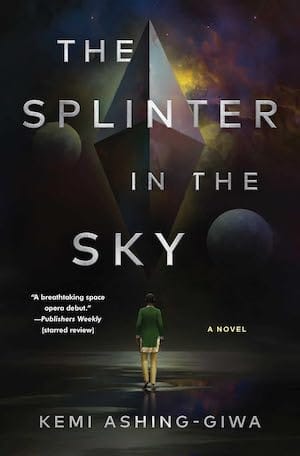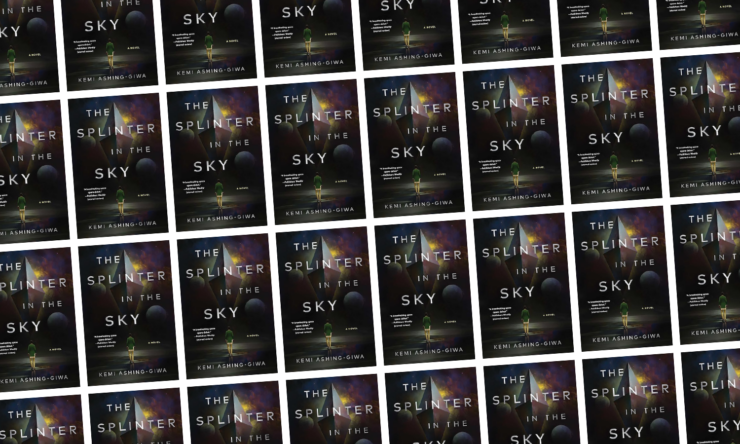During covid lockdown, Kemi Ashing-Giwa discovered tea and N.K. Jemisin’s The Fifth Season. And like her protagonist Enitan Ijebu, tea-specialist-turned-spy, this debut author has brought us a space opera thriller with notes of some of your favorite SFF while discovering inventive new ways to critique colonialism through a sci-fi lens, in a standalone novel that nonetheless has an eye toward a hopeful future.
What sends Enitan up to the eponymous Splinter in the Sky is loss: Koriko, her lunar homeland, has been colonized by the Holy Vaalbaran Empire, with any shreds of independence threatened to be swallowed up by their relatively new rulers. Her sibling Xiang goes missing, and when she appeals to Koriko’s governor Ajana Nebaat (also her ex-girlfriend) for help, she gets murdered for interfering. By the time Enitan maneuvers her way into becoming a political prisoner up in the Splinter, Vaalbara’s floating capital, she is determined to find Xiang without anyone else getting hurt. But then her shuttle gets intercepted by representatives from the Ominirish Republic, who supposedly just signed a peace treaty with Vaalbara but who can’t help but take advantage of this desperate Korikese representative who will make the perfect spy for them.
But once Enitan becomes embedded in the Splinter, she discovers that there are many Vaalbaran citizens and aristocrats who want a piece of her: her modest fame as a tea specialist, her scandalous training as a scribe, her “exotic” appeal as a supposed barbarian. Before she knows it, she’s an unwitting double agent, spying on Vaalbara for the Ominirish but also keeping tabs on Vaalbara’s inner circles of conspiracy for the recently-crowned God-Emperor herself. These personal and political threads make for a propulsive drama that only occasionally falters in the spots where it tries to do too much.
Buy the Book


The Splinter in the Sky
In addition to Jemisin’s Broken Earth series, Ashing-Giwa pulls other influences from Arkady Martine’s Teixcalaan (the Splinter is like the dark inverse of the Jewel of the World) and Ann Leckie’s Ancillary Justice and its sequels. Enitan wields her uniquely blended Korikese teas in a manner that feels in conversation with the Radchaai’s love of the drink and its attendant rituals, especially as pertain to key moments of intrigue and revolution. But Enitan turns her performance into an act of subterfuge, using the distinctive stages of the ceremony—and her status as a barbarian prisoner—to eavesdrop on the arrogant Vaalbarans.
It’s a brilliant device that serves different purposes depending on where in her search Enitan is. It also casts her in different roles according to who she’s serving and when: The same cup she might have brewed with love for Xiang as they studied for their architectural exam becomes a foreign artifact to be cooed over by bigoted and ignorant Vaalbarans who, left to their own devices, would dilute or outright steal the drink and pass it off as their own. Much as Enitan struggles to keep her focus on finding Xiang, her interactions with the Splinter’s inhabitants make it clear that they have no intention of regarding Korikese culture as an equal, but instead as artifacts to steal and pervert, resources to drain and hoard. What begins as a rescue mission boils over into the need to upend the entire empire.
It’s not all as easy as pouring a special brew, either; as Enitan delves deeper into the conspiracies that prop up the throne, she gets the shit kicked out of her more than once. These interludes of unflinching violence are shockingly realistic, as Enitan has no soldier training nor ability to protect herself. And yet every time she licks her wounds and prepares to try again.
Ashing-Giwa gives especial care to portraying a vast array of relationships, familial and romantic, in nuanced ways. Enitan and Xiang have been siblings since childhood; while each has blood relations, Korikese society paired them together instead, and their love and care for one another is unconditional.
Then there’s Deora, a Vaalbaran countess and Enitan’s host in the Splinter. She’s Three Seagrass (from A Memory Called Empire) without the romantic attraction, a well-meaning ally who seems to respect Korikese culture—and, to Enitan’s chagrin, has learned to cook it nearly authentically—yet who will never be a true friend because she will never stop thinking of her charge as a barbarian to be studied at arm’s length.
Where Enitan’s relationships in the Splinter do hew closer to Teixcalaan’s intimate intrigues is in her interactions with the God-Emperor. To friends (or conspirators trying to usurp her) she’s just Menkhet, a brilliant general who nonetheless was not ready to become an Imperator who’s more figurehead than divinely-crowned ruler. Their shifting dynamics, from down-to-earth attraction to Menkhet occasionally pulling out her power like a sheathed sword, make for a fascinating burgeoning romance. But just as these Vaalbarans may never fully see Enitan, can Enitan trust them seeing the entirety of who they are and what they represent?
At one point in the novel, Enitan wields the typical poison and its antidote as she interrogates a conspirator for more names of Vaalbara’s shadow council. Except—she doesn’t necessarily say antidote, she says that the second dose will ease the woman’s suffering. And it does, by killing her. It’s a keen metaphor for the subjugation of empire: Despite all false promises of university degrees or court invites, there is no real growth, only death. But perhaps death could also pave the way for actual change.
There are a number of tonal shifts that come about as more puzzling than intentionally disorienting. The introduction of synths, forbidden in the Vaalbaran Empire, adds unnecessary clutter to the narrative without a proportional amount of depth: An established cultural taboo is broken without much fanfare, and then the plot moves on without much examination of what it means to have these characters occupying the intrigue, other than being conveniently strong bodyguards for Menkhet. And while Enitan and Xiang have a strong bond built on humor, wisecracking moments between the two of them don’t always fit with the incredibly high stakes, not even in a gallows-humor sort of way. A rushed surprise final act drags one mythical figure out of hiding and elevates another more mundane player to gamemaster status, but unfortunately by that point the reveal is rather telegraphed.
Not all of Enitan’s tea rituals are performed flawlessly; more than once she mourns the impact lost when a Vaalbaran mishandles the brew, or hurries through the stages, or (completely misunderstanding the ceremony) drinks all of the cups at once instead of spreading them out and letting their individual flavors linger. At times, The Splinter in the Sky resembles a rushed tea ceremony, with certain plot points not given their proper time to linger or develop into something deeper and more nuanced. But if you look into its figurative dregs at the end, you’ll still find a profound message that will stick with you long after you’re done.
The Splinter in the Sky is published by Saga Press.
Natalie Zutter cannot wait until “tea-centric space opera” is its own subgenre. Tell her about your favorite SFF on Twitter and Bluesky!










